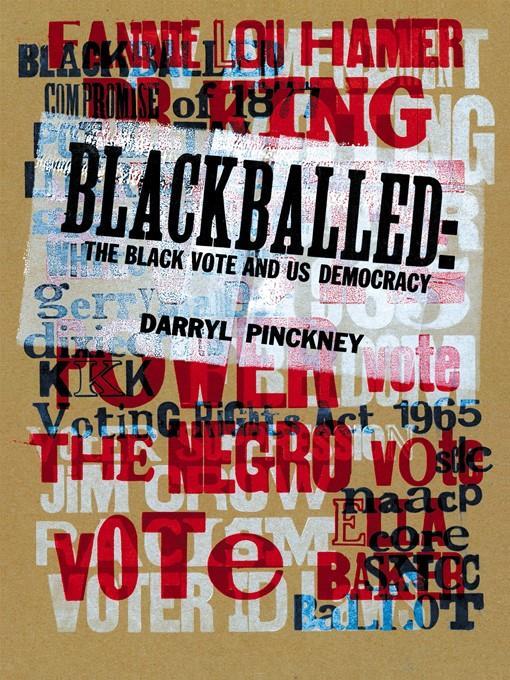
Blackballed
The Black Vote and US Democracy
کتاب های مرتبط
- اطلاعات
- نقد و بررسی
- دیدگاه کاربران
نقد و بررسی

Starred review from August 11, 2014
The tactics have changed since the days when an “all-white school board in fired 32 black teachers who’d applied to register,” and when “no blacks were registered to vote” in a Mississippi county “that was 81% black,” but as novelist and essayist Pinckney (High Cotton) observes, there are now “new means by which to achieve the old aim: voter exclusion.” Pinckney conveys, calmly and lucidly, what this portends for American democracy. Other themes are embedded in his observations about the ballot: the impact of Obama’s presidency, which encompasses both his profound symbolic significance and the unfulfilled promise of a post-racial society; a purposeful and moving tribute to Pinckney’s parents and their generation’s engagement with civil rights; and the changes that have occurred since the Voting Rights Act of 1965, the “most important piece of civil-rights litigation since the Fifteenth Amendment.” The emergence of new forms of discrimination include “gerrymanderings, redrawing districts, or at-large voting instead of district-by-district voting,” all “in the direction of trying to reduce the impact of the minority vote.” Pinckney’s book, which is the outgrowth of a lecture, is much like Doctor Who’s TARDIS: it appears small on the outside, but a capacious and mind-opening experience awaits within.

August 15, 2014
A slim volume of two essays that challenge the very notion of a "post-racial" America. It's fitting that New York Review Books is the publisher, since both of these pieces by the publication's frequent contributor read more like literary surveys than political broadsides. Not that Pinckney (Out There: Mavericks of Black Literature, 2002) sounds like some sort of academic drone; it's just that he seems more interested in being precise than provocative. The lead (and title) piece derives from a lecture he gave at the New York Public Library describing the struggles of black voters to cast a ballot even after legally being accorded that right and the conservative attempt to again disenfranchise such voters by permitting states to impose onerous regulations. It mixes familial reminiscence with historical perspective, culminating in the mixed blessing of Barack Obama's presidency: "Obama's universalism had 'morphed' into a race-neutral or color-blind approach to policy that sidelined issues important to black voters, who accepted the situation because they felt that Obama had to be protected from the right." The second and shorter piece, "What Black Means Now," which appeared in the NYRB, encompasses a number of books on the subject, as it analyzes the notion of a monolithic blackness in identity, voice, culture and politics. It is particularly incisive on the process of marketing black stereotypes, "turning what have been regarded as cultural defects into cultural virtues." He writes of "the part the rap aesthetic has played in reconciling the black revolutionary imperative with the materialism in American society" and how "hip-hop crossed racial and class boundaries, its transgressive postures speaking to almost any young man in its orbit." Not a manifesto but a thoughtful examination of ideas that others have been circulating.
COPYRIGHT(2014) Kirkus Reviews, ALL RIGHTS RESERVED.

Starred review from November 1, 2014
For the past couple of election cycles, the validity of voters has come into question as states pass stringent voter identification laws. Especially for African Americans, this questions democratic legitimacy. Pinckney (contributor, New York Review of Books; Out There) details how the history of the African American vote has shaped the psyche of political participation. In this short study, the author relies on scholars, commentators, and personal anecdotes to define how the ballot is a powerful evolving tool that African Americans can use to change society. He also condemns recent challenges to the vote, such as Shelby County v. Holder, actions by the conservative nonprofit Citizens United, and increased voter ID laws as ways for African Americans to be silenced. Pinckney concisely develops his arguments with this brief commentary, which is a good starting point or brush up for those who lack knowledge about the African American voting experience. For greater in-depth analysis, refer to Frances Fox Piven, Lori Minnite, and Margaret Groarke's Keeping Down the Black Vote, Richard M. Valelly's The Two Reconstructions, or J. Morgan Kousser's Colorblind Injustice. VERDICT Recommended for political junkies and those seeking a quick study to gain a basic understanding of the importance of voting rights for African Americans.--Jacob Sherman, Texas A&M Univ. Lib., San Antonio
Copyright 2014 Library Journal, LLC Used with permission.

























دیدگاه کاربران